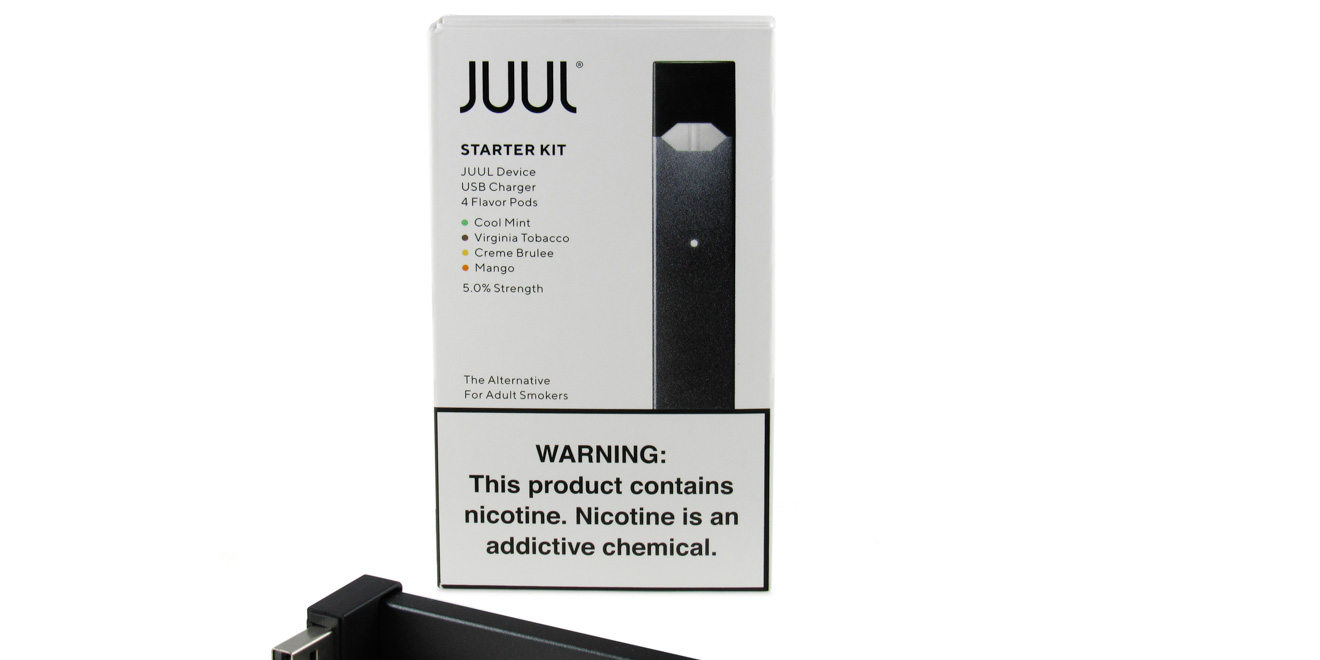On Wednesday, Juul Labs CEO Kevin Burns stepped down amid controversy over the dangers of vaping, the latest development in intense public scrutiny surrounding the billion-dollar company founded by Adam Bowen M.S. ’05 and James Monsees MFA ’06. The company also stated that it would accede to a Trump administration plan to ban flavored e-cigarettes.
Juul Labs, which spun out from vape company Pax Labs, has found massive commercial success in selling its inconspicuous USB-like vaping devices, which work with pods that come in flavors from mango to Virginia tobacco. Though e-cigarette manufacturers often describe their products as intended to help long-term cigarette smokers quit the habit — and push back on allegations that they’ve marketed to teenagers — the rising prevalence of youth vaping and a spate of vaping-related illnesses have cast a negative light on the industry.
When Bowen and Monsees began experimenting with electronic cigarette prototypes in 2004 as part of their graduate thesis, the electronic-cigarette industry was far from the cash cow it is today. The pair founded Pax Labs under the name Ploom in 2007 and launched their inaugural model, ModelOne, in 2010. After selling some assets to Japan Tobacco International several years later, Ploom became Pax Labs, from which Juul Labs was spun out in 2017.
Bowen and Monsees, who currently serve as Juul Labs’ chief technology officer and chief product officer, have each seen their net worth pass $1 billion.
By the end of 2017, after growing more than 600% within a year, the Juul had become the archetypal e-cigarette. By fall 2018, the company had amassed a market share of 72%. “Juul” became the de facto verb for using a pod-based e-cigarette.
The explosive growth has brought growing concern about teenage usage and potential health concerns. A federal study released in Dec. 2018 found that 37% of high school seniors reported using an e-cigarette in the past year.
While federally funded anti-smoking campaigns have led to an all-time low in young adult cigarette usage, misperceptions about the health risks associated with e-cigarettes and nicotine addiction have survived.
In spring 2018, the high proportion of underage users and concerns that Juul had marketed to teenagers brought the FDA to launch an investigation into whether Juul Labs was intentionally pitching their devices to the underage.
In congressional hearing on that investigation in July of this year, California Rep. Mark DeSaulnier, whose district includes some of the East Bay, reminded two executives — Monsees and Juul Labs chief administrative officer Ashley Gould — that Juul Labs had prior incidents of dishonesty, citing an example from last year when they had lied about using material from a Stanford Medicine tobacco education toolkit. The resource is made up of digital modules that explain the inner workings and health consequences of e-cigarettes and nicotine.
“The toolkit is an online set of curriculum and materials aimed for educators to teach middle and high school students about tobacco,” said pediatrics professor Bonnie Halpern-Felsher told The Daily. “We have a module about nicotine addiction that Juul Labs just copied and put into their own curriculum.”
When Stanford Medicine originally reached out to Juul Labs to request they stop using the toolkit, “[Juul] denied taking any materials from us, which was interesting because when I got a copy of their curriculum we found out that they had been verbatim using them,” Halpern-Felsher said.
After the hearing, a Juul spokesperson said, “Stanford’s toolkit was posted on its website for public use to fill the gap in public health education.”
Halpern-Felsher said that while it is indeed free and published online, it is still a copyright infringement to use the toolkit without attribution.
“It was just one piece of evidence showing that they were not being honest about what they were doing,” she added.
On Sept. 9, the FDA published a warning letter to Juul Labs that stated the company had marketed “unauthorized modified risk tobacco products by engaging in labeling, advertising, and/or other activities directed to consumers.” Juul Labs had 15 working days to provide a written response detailing a plan to remain federally compliant.
Health concerns
In addition to questions about their marketing material, there are new health concerns about Juuling after a vaping related respiratory illness caused seven fatalities this summer. In total there have been 530 cases of vaping related illness in 38 states and one U.S. territory, according to the CDC.
In response President Trump proposed a ban on most flavored e-cigarettes — which account for 85% of Juul Lab’s sales — in an attempt to curb usage, especially by young people. A federal study found that one in four 12th graders had vaped with just flavored pods last year.
San Francisco, the headquarters of Juul Labs, is taking an even harder line with an ordinance effective January 2020 that bans the sale of e-cigarettes that, like the Juul, have not been reviewed by the FDA.
Juul Labs has funded an effort called Coalition for Reasonable Vaping Regulation to advocate regulation rather than an outright ban.
“We believe any proposal to leave cigarettes — a product that kills 8 million people a year — on the shelves, while banning e-cigarettes — a product that according to Public Health England is 95% less harmful than traditional cigarettes — is ridiculous,” the Coalition wrote on their webpage.
A previous version of this article incorrectly stated that San Francisco’s ban affected all e-cigarettes. The ban affects e-cigarettes that have not been reviewed by the FDA. The Daily regrets this error.
Contact Paxton Scott at paxtonsc ‘at’ stanford.edu.
